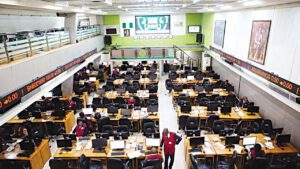Nigerian Commodity Exchange remains unviable without effective polices despite N50bn recapitalisation — Stakeholders
The recapitalisation of the Nigerian Commodity Exchange to the tune of the N50 billion by the Nigerian Government may just be out of place without the relevant polices to drive to the exchange.
As a result, the Nigeria Commodity Exchange (NCX) has called on the Government to enact policies that would incentivize agricultural commodity sellers on the one hand, to migrate from the open market to the floor of the exchange to transact their businesses.
The Exchange, on the other hand, also called for a framework that would force all high-level transactions in commodities to be traded on the organised market.
The General Manager, Operations, NCX, Mr. Benson Lawal, said though President Muhammadu Buhari-led administration must be commended for significantly increasing funding intervention to the agricultural sector as well as funding the exchange, this may not translate to the viability of the NCX unless effective policies were introduced.
Only about seven commodities are currently traded on the floor of the exchange, partly due to low patronage.
The Central Bank of Nigeria (CBN) recently embarked on a process to recapitalise the exchange with N50 billion, to check price arbitrage and enable it achieve its primary mandate.
Lawal argued that the movement or success of the exchange was not dependent on the amount of money committed to it but on what stakeholders especially farmers stand to benefit from operating in the formal market rather than the open market which they are already used to.
Speaking when the Agriculture Commodity Forum (ACF), led by its Chairman, Mr. Bashir Yusuf Ibrahim, paid a courtesy call on the exchange, Lawal said, for the government to achieve results even as it seeks to recapitalize the exchange, it must get more participation on the floor especially those willing to sell and others who are ready to buy as well.
He explained that for commodity traders who have since been used to the open market to embrace the formal market, they definitely needed to be incentivized as they would want to first know what they stand to achieve by trading on the floor.
He, however said unlike on the floor, the risk of default remained high open market, while people buy commodities at their face-value, unable to immediately determine the level of impurities.
On the other hand, he noted that the exchange was liable for any default adding that, “how you are going to get your money for commodity sold is responsibility of the exchange.”
He added that the NCX had a resemblance of a perfect market and links traders to external markets.
Lawal added that, “government needs incentives that will compel buyers and sellers to meet on the exchange.”
While welcoming a partnership between the exchange and the commodity association, Lawal said the present challenge of NCX was more of demand than supply because by the structure of production in the country, about 95 per cent of national output of different commodities comes from smallholder farmers who have low per capita output.
He said the only way the association can trade directly on the floor was for them to form themselves into cooperatives adding that they have the mechanism to better their living standards through appropriate pricing of their commodities.




